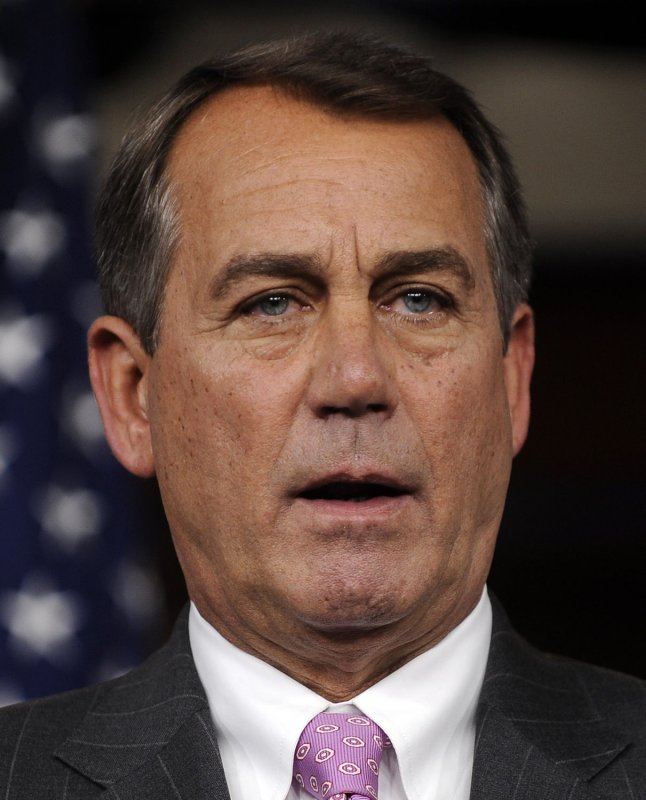Speaker of the John Boehner, R-OH, discusses budget issues with the media on Capitol Hill in Washington on April 14, 2011. The continuing resolution cuts nearly $40 billion in spending authority, resulting in $315 billion in reductions over the next 10 years, Boehner said. UPI/Roger L. Wollenberg |
License Photo
WASHINGTON, April 14 (UPI) -- The U.S. Senate Thursday passed a budget for the remainder of the current fiscal year, sending it to the White House for President Barack Obama's signature.
On a vote of 81-to-19, the Senate approved a measure passed earlier in the day by the House on a 260-to-167 vote. In the House, 81 Democrats voted in favor of the continuing resolution to fund government until Sept. 30, while 59 Republicans voted against it.
White House press secretary Jay Carney issued a statement saying the administration was "pleased that Democrats and Republicans, on behalf of all Americans, were able to reach an agreement to avert a government shutdown by making significant spending cuts while still investing in our future."
"Because of this deal, small businesses will continue to receive loans, families will continue to receive mortgages, and hundreds of thousands of government workers and our military personnel will get their paychecks on time," the statement said. "We all know there are tough challenges ahead, from growing our economy to reducing our deficit, but we must build on this bipartisan compromise to tackle these issues and meet the expectations of the American people."
Obama met at the White House Thursday with the co-chairmen of a deficit reduction commission he appointed last year and said again efforts to reduce the deficit must include changes in security spending, the tax code and allowing tax cuts for the wealthiest Americans, passed during the administration of former President George W. Bush, to expire, The Washington Post reported.
"We can't exempt anybody from these efforts," Obama said.
The continuing resolution cuts nearly $40 billion in spending authority, resulting in $315 billion in reductions over the next 10 years, House Speaker John Boehner, R-Ohio, said.
"Does it cut enough? No," Boehner said, adding that debt and deficit reduction had to begin somewhere. "It's like driving down the highway and throwing your car in reverse."
"Is it perfect? No. I'd be the first to admit it's flawed," he said. "Welcome to divided government. … This is the best we could get out of divided government."
Speaking animatedly against the measure, Rep. Rosa DeLauro, D-Conn., said the bill benefits the wealthy and big business at the expense of the poor and programs that assist the poor.
"The American people expect better from us," she said.
"Members will have to consider all the ramifications … and vote their conscience," said Rep. Norman Dicks, D-Wash., the ranking Democrat on the Appropriations Committee, telling members that the bill wasn't perfect but is needed to keep the government running.
Rep. Steny Hoyer, D-Md., the minority whip, said the House faced a choice.
"That choice is whether we will come together, work together, try to make the best possible agreement we can make and then move together," Hoyer said, announcing he would vote for the resolution. "I think the American people [expect] that."
Perhaps saying aloud the sentiment most in the House were thinking, Rep. Harold Rogers, R-Ky., chairman of the House Appropriations' Committee, said "I just want this bill over with."
Rogers and other speakers noted debate would begin soon enough on the 2012 budget and the philosophical differences between the parties.















